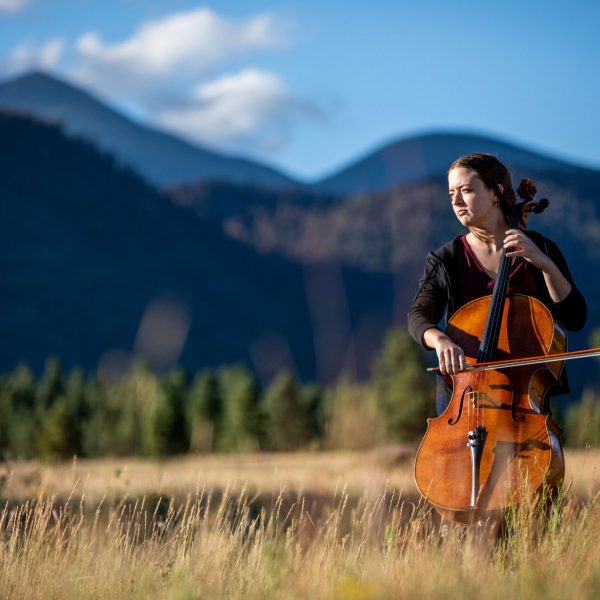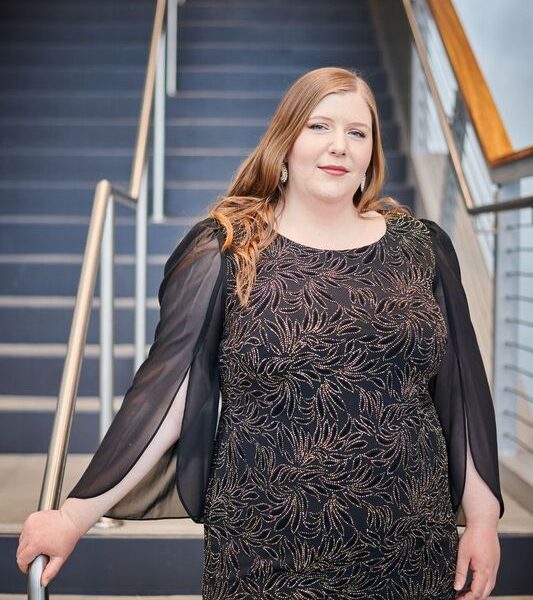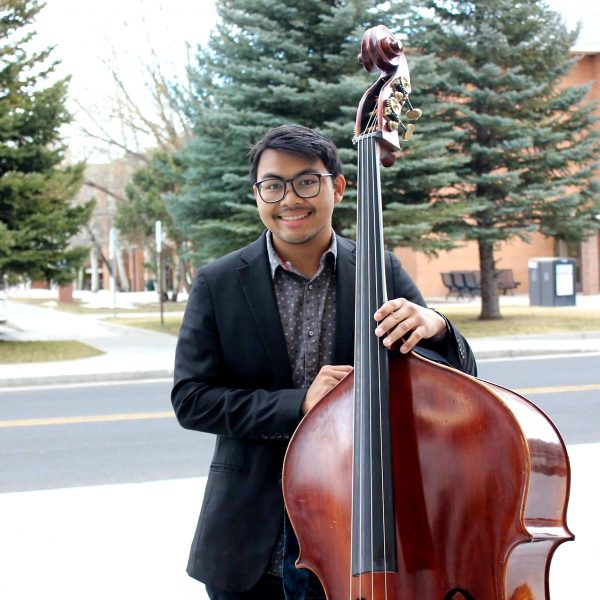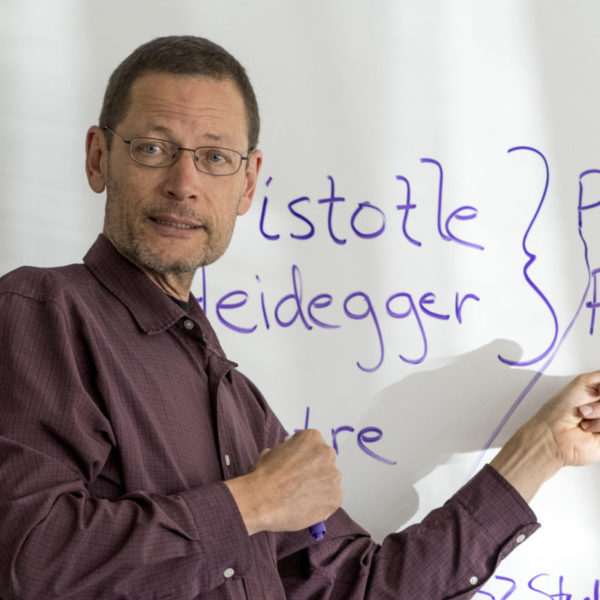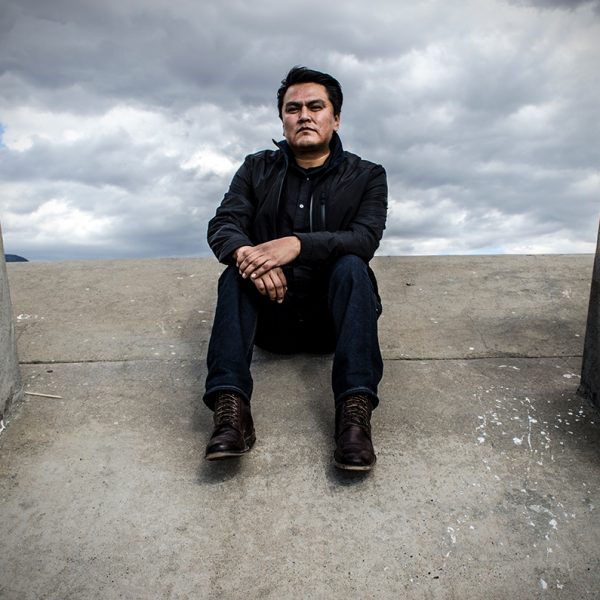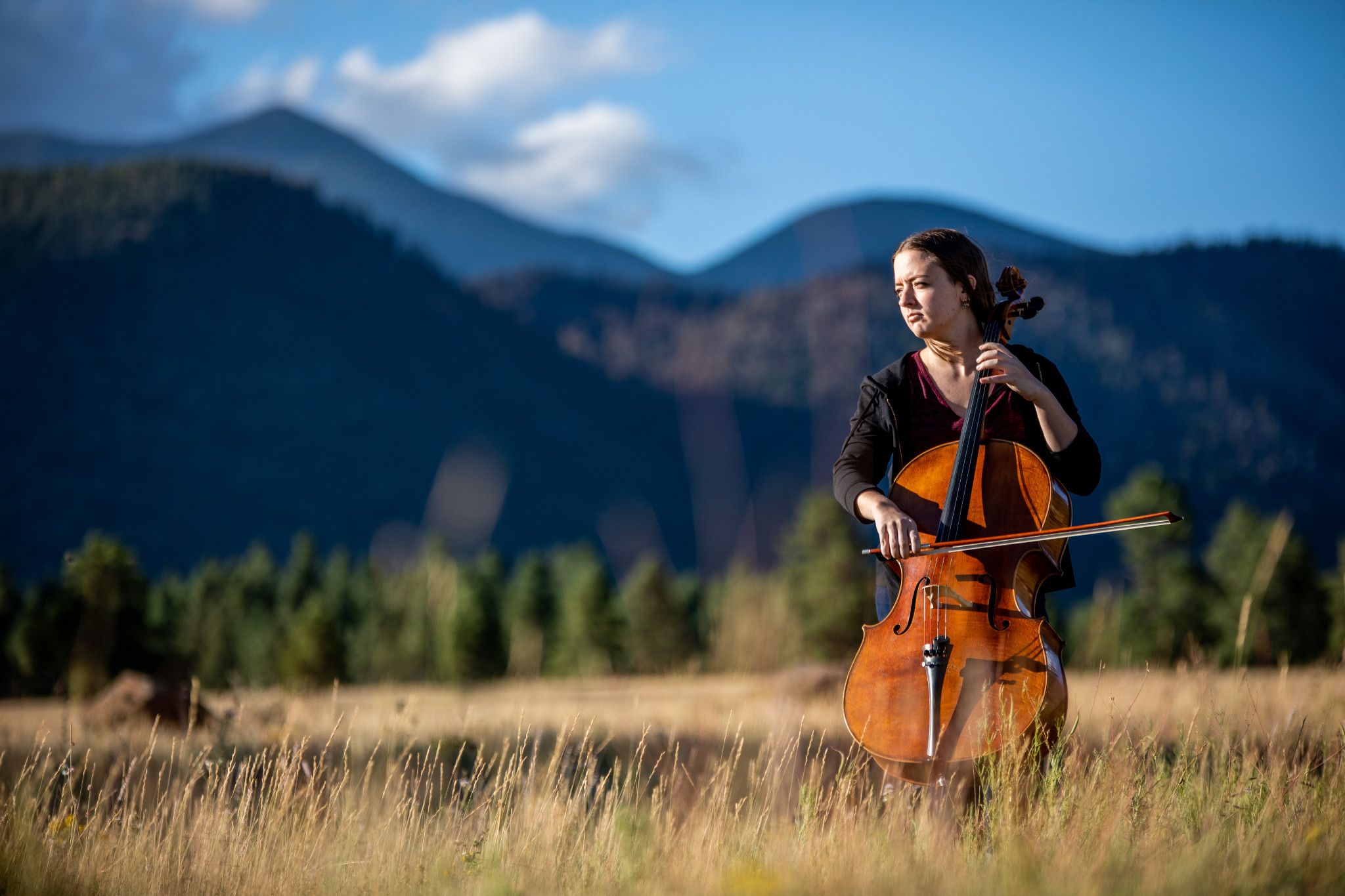
NAU alumna Patricia Burton has found a means of expression that has survived centuries: the cello.
Patricia Burton, BMEd Music Secondary Education and BMus Music Performance – Instrumental, ’18, explains that the cello’s “wide range in pitch gives variety in sound, while the tone is so deep and rich that it can very easily touch the soul.”
Burton recalls playing Bach’s Cello Suites “accompanied only by the birds and the wind through the trees” in an area called Aspen Corner on the San Francisco Peaks. Now working toward a graduate degree at Ball State University in northeast Indiana, she said, “I have a mental picture of playing in the aspens when I’m performing on stage,” explaining that the meditative scene relieves stress and allows her to “more easily feel what the composer wanted to portray and to more freely convey that and my own feeling to the audience.”
That depth of feeling is what draws Burton to the composer who has most influenced her: Dmitry Shostakovich, a twentieth-century Russian whose avant-garde style was condemned as too radical by Stalin’s regime. She explains that “despite the restrictions— the immense artistic oppression he faced—Shostakovich found freedom to write expressive, moving music.”
Growing up in Phoenix, she began playing the cello in fourth grade and progressed throughout high school, excelling in AP coursework, including advanced calculus. Burton found that math enhances the creative process and “makes pathways to connect real-life questions and think outside the box.” She earned a seat in the school’s top orchestra.
Helping her succeed
But she credits two professors in the NAU School of Music—her cello teacher, Mary Ann Ramos, and orchestra director, Daniel O’Bryant—with giving her the freedom and inspiration to create her own career path and style of expression.
Although she had been awarded a Lumberjack scholarship, Burton said what clinched her choice to study at NAU was a lesson with Dr. Ramos that followed her initial audition: “I learned so much in that one lesson. It’s really about the teacher, and I really enjoyed studying with her.”
Burton started her program at NAU with only a music education major. When she expressed her interest in adding a performance major, she said, “Dr. Ramos figured out the requirements for a performance degree and what pieces I needed to play to succeed in reaching my goals. She also showed me the importance of routine, to practice the fundamentals—playing scales and working on technique. She taught it so well that it didn’t feel like work, and I appreciated how doing it every day makes me a better musician.”
As the director of orchestras, Dr. O’Bryant also encouraged her to explore the pros and cons of teaching, performance, and conducting—and how to best employ her passion for music.
Burton said that these connections with her mentors were vital to her progress: “I asked so many questions about career paths and about their own lives and what affected them,” adding that they fostered her love for opera and musicals. And, she said that without “all the hours of quartet coaching from Dr. Ramos, I would not be the chamber musician I am now.” Burton also enjoyed the “super tight-knit community” in the music education program that she calls a “mini family,” a cohort that stayed together from freshman year through graduation. She particularly appreciated participating in the opera program, a valuable opportunity unavailable to undergraduates in most other universities, explaining, “what stood out to me was being able to be in the orchestra, accompanying fabulous vocalists who really made me want to be good for them.”
Next steps
She said that she chose to further her studies at Ball State University because Dr. Ramos had gone to school with a cello teacher there who focuses on technique—and who is now also “super supportive” of Burton’s dream to combine performance with teaching.
Burton has performed online but relishes performing in traditional settings, noting that live performances are “easier because you feel the audience—see them, hear their applause, and feel their energy, interactively listening.”
At the end of the day, I can always pick up my cello and play. It gives me a means of expression—to tell my feelings through music.
Her philosophy as a teacher reflects her experience with her NAU mentors: “My goal as a music educator is to provide students the opportunity and tools to cultivate their own musicianship. They might not like Bach or Beethoven—they might like twenty-first century experimental music—and that’s fine. If classical music continues to survive, we have to keep up with times and allow pop influences to affect our music.”
As for her taste in pop music, she said she enjoys Taylor Swift and the Jonas Brothers. They often have orchestras and quartets with classically trained musicians accompanying them on stage. But she said she also listens to “basically whatever is popular on the radio.”
What’s in her future? She dreams of completing her PhD, and perhaps she’ll travel to the great halls of Vienna. “Most musicians want to go to Austria to see where Mozart and other classical composers wrote and played,” she said. “Hearing orchestras there would be amazing.”
But for now, she said, “At the end of the day I can always pick up my cello and play. It gives me a means of expression—to tell my feelings through music.”

